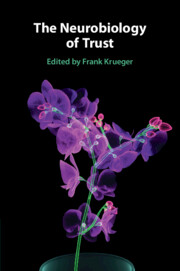Book contents
- The Neurobiology of Trust
- The Neurobiology of Trust
- Copyright page
- Dedication
- Contents
- Figures
- Tables
- Contributors
- Abbreviations
- Introduction
- Part I Fundamental Level of Trust
- Part II Neuropsychological Level of Trust
- Chapter 5 Trust and Risk
- Chapter 6 Trust and Emotion
- Chapter 7 Trust and Reputation
- Chapter 8 Trust and Learning
- Part III Neurocharacteristic Level of Trust
- Part IV Neuromolecular Level of Trust
- Part V Neuropathological Level of Trust
- Index
- References
Chapter 6 - Trust and Emotion
The Effects of Incidental and Integral Affect
from Part II - Neuropsychological Level of Trust
Published online by Cambridge University Press: 09 December 2021
- The Neurobiology of Trust
- The Neurobiology of Trust
- Copyright page
- Dedication
- Contents
- Figures
- Tables
- Contributors
- Abbreviations
- Introduction
- Part I Fundamental Level of Trust
- Part II Neuropsychological Level of Trust
- Chapter 5 Trust and Risk
- Chapter 6 Trust and Emotion
- Chapter 7 Trust and Reputation
- Chapter 8 Trust and Learning
- Part III Neurocharacteristic Level of Trust
- Part IV Neuromolecular Level of Trust
- Part V Neuropathological Level of Trust
- Index
- References
Summary
We review research investigating the influences of affective states on trust. To delineate the behavioral and neural effects of emotions on trust decisions, we consider research from Economics, Psychology and Neuroeconomics. We focus on behavioral and neural research that examined the impact of moods and emotions experienced at the moment of choice, and critically examine evidence concerning both positive and negative incidental and integral emotions. Overall, a pattern emerges from previous findings that strongly suggests that both incidental and integral emotions can influence decisions to trust. Specifically, positive incidental emotions, such as happiness, can enhance trust while negative incidental emotions, such as anxiety, reduce trust. At the same time, neuroimaging findings suggest that this behavioral effect is paralleled by emotions having specific effects on decision-relevant neural circuitry. Emotions alter activity during trust decisions in the temporoparietal junction and medial prefrontal cortex, which have been implicated in theory of mind, as well as the anterior insula, which is commonly implicated in anticipatory negative affect. We conclude by pointing at important avenues of research regarding the role of emotions in learning to trust from past experiences, as well as the chronic distortions of affect and social behavior commonly observed in psychopathology.
Keywords
- Type
- Chapter
- Information
- The Neurobiology of Trust , pp. 124 - 154Publisher: Cambridge University PressPrint publication year: 2021
References
- 3
- Cited by

